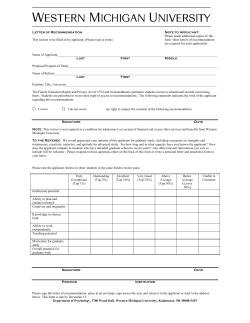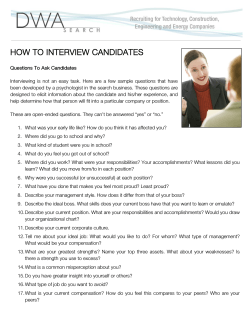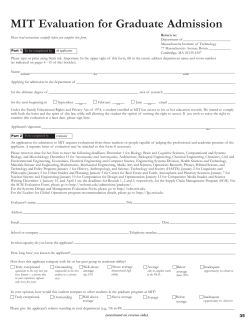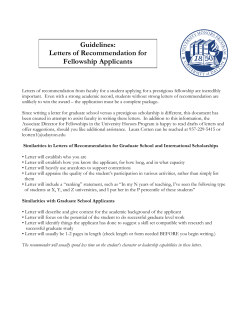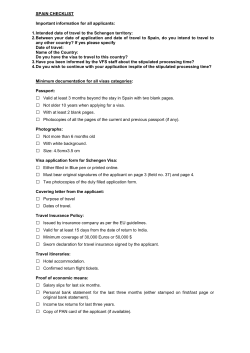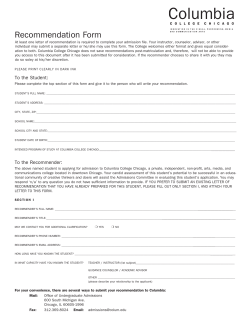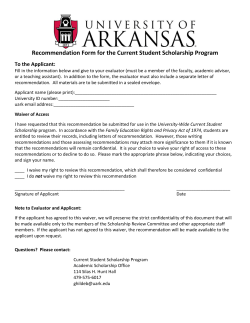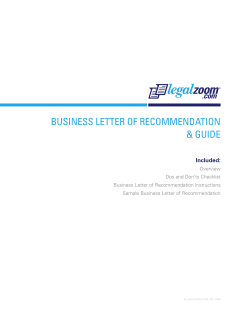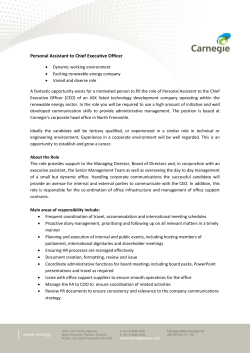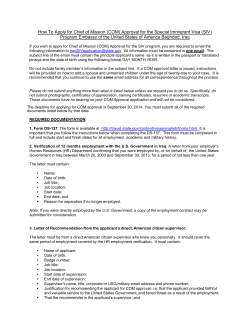
REFERENCE LETTERS
REFERENCE LETTERS These slides provide important information about the purpose of reference letters, the differences in the types of reference letters, and the information that should be included in reference letters. Good references can help you clinch a job offer so be sure to have a strong list of references who are willing to attest to your capabilities. WHAT ARE REFERENCE LETTERS AND WHEN ARE THEY USED? A reference letter, also called a recommendation letter, is usually written to testify to a person’s skills, character, experience, and/or achievements. When a candidate applies for a job, he or she will submit reference letters to support his or her application. LBWCC requires professional letters of reference which describe the applicant’s skills, abilities, and work experience relevant to the position for which the person is applying. These letters may be written by current or former supervisors, co-workers, customers, or other business professionals who have first-hand knowledge about the applicant. WHAT SHOULD BE INCLUDED IN A REFERENCE LETTER? As the candidate, you may want to send your résumé, transcript, curriculum vitae, or any other materials that will help the person writing the letter of reference accurately describe you. You may also include a description of the position for which you are applying and information about the company. A letter of recommendation should be more than one or two paragraphs; a letter this short suggests the author either does not know you well or does not fully endorse you. However, the letter should be concise and focus on a few key points so it does not have to be more than one page. It is often helpful for the writer to introduce himself/herself in the first couple of lines of the letter. In a brief sentence or two, the writer should explain his/her position and relationship to the candidate. It is usually helpful to know how long the writer has worked with or known the candidate. The next sentences should confirm any facts about employment history such as: • The applicant’s job title and role within the company. • The status of the employment such as current, previous, full-time, part-time, temporary. • The dates of the person’s employment. The third paragraph should provide judgment upon the candidate’s skills and qualities (excellent communication skills, organization skills, etc.) and should single out any exceptional qualities that the candidate has – perhaps drive and enthusiasm, attention to detail, or ability to lead. It is important that the letter describes experience, qualities, and skills that relate to the specific job opportunity. Reference letters usually end on a positive note and clearly state that the candidate is recommended for the position. If the writer is willing to receive further correspondence about the candidate’s application, it is also important for the writer to include his/her contact information. WHAT SHOULD BE AVOIDED IN A REFERENCE LETTER? Writing in an informal manner: Keep the letter business-like. Jokes, slang and casual language are not appropriate and may harm the candidate’s chances. Including personal information not relevant to the application: Mentioning the candidate’s race, political stance, religion, nationality, marital status, age, or health is usually inappropriate. Spelling mistakes, sloppy writing, or typos: This letter is hugely important and you should take care to make sure it looks professional. WHAT IS THE DIFFERENCE BETWEEN A PROFESSIONAL REFERENCE AND A CHARACTER REFERENCE? Professional Reference A professional letter of reference should discuss your work performance and attest to the skills, experience, and abilities that you have which best qualify you for the job. While the reference may discuss the applicant’s personality, job performance, punctuality, teamwork, experience, and work ethic are necessary discussion in a professional letter of reference. A professional reference is typically a current or former employer, colleague, client, vendor, supervisor or someone else who has first-hand knowledge and can recommend you for employment. Character Reference A character reference letter discusses the candidate's personality, character, and overall abilities. A character reference letter lacks specific information about the applicant’s previous employment. Often, this type of letter does not describe how the applicant’s skills, abilities, etc. relate directly to the position for which he/she is applying. Character references focus on a broad overview of traits and abilities without specific references to the needs of the position. REFERENCE LETTER EXAMPLES You can find examples of full reference letters on About.com’s “job searching” section. This website lists letters appropriate for a variety of situations. Here is an example of a professional reference letter. LBWCC requires professional reference letters be included with application materials rather than character references. EXAMPLE OF A PROFESSIONAL REFERENCE LETTER To Whom it May Concern: I highly recommend (Applicant’s Name) as a candidate for employment. (Applicant) was employed by (Company Name) as a (Position Title) from 2002 - 2005. (Applicant) was responsible for office support including word processing, scheduling appointments and creating brochures, newsletters, and other office literature. (Applicant) has excellent communication skills. In addition, (he/she) is extremely organized, reliable and computer literate. (Applicant) can work independently and is able to follow through to ensure that the job gets done. (He/She) is flexible and willing to work on any project that is assigned to (him/her). (Applicant) was quick to volunteer to assist in other areas of company operations, as well. (Applicant) would be a tremendous asset for your company and has my highest recommendation. If you have any further questions with regard to (his/her) background or qualifications, please do not hesitate to call me. Sincerely, John Smith Title Company Address Phone Email Here is an example of a character reference letter. LBWCC does not consider character reference letters in lieu of the required professional reference letters. EXAMPLE OF A CHARACTER REFERENCE LETTER To Whom it May Concern: I am writing to recommend (Applicant) for a position with the Town of Smithtown. I have known (Applicant) since (he/she) was a child and (he/she) is a highly qualified candidate for a position in town government. (He/She) has lived in Smithtown for most of (his/her) life, (he/she) is involved in (his/her) local community, (his/her) church, and (his/her) children's schools. (Applicant) has shown (his/her) commitment to the town as a Member of the Board of Appeals, and as an active participant in many community endeavors. (Applicant) would be a tremendous asset to the town and I recommend (him/her) to you without reservation. If you have any questions, please do not hesitate to contact me. Mary Smith REFERENCE LETTER DO'S AND DON'TS Just as a good reference letter can be an asset, a bad reference letter can be a hindrance for an applicant. Here are some do’s and don’ts to keep in mind when securing your professional reference letters: Do’s Do choose someone who knows you well enough to give you a recommendation. Do get recommendations from employers, professors, school administration, and anyone else who has first-hand knowledge of your work experience and qualifications. Do ask for the recommendation in person, rather than sending an email. Do tell the letter writer why you need the reference letter. Do mention specific experience, qualifications, and skills that you would like included in the letter. Do send “thank you” notes afterwards to the people who wrote reference letters. Do ask permission to keep copies of the letters in case you need to use them again in the future. Don’ts Don’t wait until the last minute. Secure reference letters as soon as possible. Don’t ask someone to provide false or second-hand information. Don’t ever forge signatures. Don’t choose someone to be a reference because of his/her title. Choose someone who can verify firsthand how your experience, skills, and abilities qualify you for the job. Don’t hesitate to get as many reference letters as possible. Submit the letters that best describe why you are qualified for the position. Don’t forget to say “please” and “thank you.” A reference and his/her recommendation are valuable resources.
© Copyright 2025

